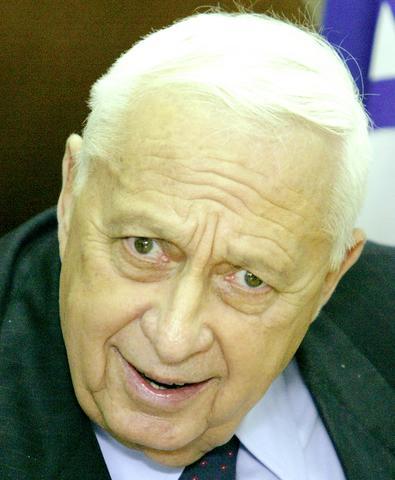The Israeli government decided in principle for the first time to remove long-established settlements from the West Bank and Gaza Strip, but Prime Minister Ariel Sharon's badly split Cabinet added provisions that cast doubt on the plan's implementation.
Sharon declared victory for his "unilateral disengagement" plan after Sunday's Cabinet vote, but opponents of settlement removal within his own Likud party were comfortable enough with the limits they imposed to go along with it -- and Palestinians were skeptical.

PHOTO: REUTERS
"Disengagement has begun," Sharon told a crowd of young Jews visiting Israel on a "birthright Israel" program just after the Cabinet vote. "The government decided today that by the end of 2005, Israel will leave Gaza and four settlements in the West Bank."
However, Cabinet opponents noted that no settlements could be removed unless approved by the Cabinet in another vote, probably no earlier than next March.
That would give settlers and their backers plenty of time to mount another campaign to scuttle the plan -- similar to the one they conducted among Likud members that led to the defeat of Sharon's disengagement proposal in a nonbinding party referendum on May 2.
The Cabinet defied the referendum results and its own ideology in its Sunday decision. Since the first Israeli settlements were established in 1968, a year after Israel captured the West Bank and Gaza in the 1967 Mideast war, no Israeli government had ordered the removal of authorized settlements there before, though some illegal outposts have been taken down.
Egypt is preparing to play a central role in a Gaza realignment. Israeli Foreign Minister Silvan Shalom was to travel to Cairo yesterday for talks about implementing the pullout plan. Egypt has offered to train Palestinian security forces and help them take control of Gaza once Israel leaves. Gaza is a stronghold of the militant Islamic group Hamas.
Shalom himself was one of the skeptics who was won over at the last minute by compromise wording that threw shadows over the possibility of implementing the plan. In the end, the proposal passed by a deceptively comfortable 14-7 margin.
The decision appeared to offer something for everyone. For Sharon and his backers, it stated, "Israel will leave the Gaza Strip, including the settlements there, and will redeploy outside the Strip."
Opponents pointed to a contradictory clause: "The Cabinet approves the amended disengagement plan, although this decision does not mean leaving settlements."
Sharon's proposal has already fractured the ruling four-party coalition and threatened its parliamentary majority, raising the prospect of a snap election even before the March vote on removing settlements.
To ensure a majority for the plan in his divided Cabinet, Sharon dismissed the two ministers from the far-right National Union Party. Another pro-settlement faction, the National Religious Party (NRP), was close to resigning.
"No word laundry can bleach one of the blackest decisions ever taken by an Israeli government, which means expulsion of thousands of residents and the creation of a Hamas terror state," said Housing Minister Effie Eitam, head of the NRP.

AIR SUPPORT: The Ministry of National Defense thanked the US for the delivery, adding that it was an indicator of the White House’s commitment to the Taiwan Relations Act Deputy Minister of National Defense Po Horng-huei (柏鴻輝) and Representative to the US Alexander Yui on Friday attended a delivery ceremony for the first of Taiwan’s long-awaited 66 F-16C/D Block 70 jets at a Lockheed Martin Corp factory in Greenville, South Carolina. “We are so proud to be the global home of the F-16 and to support Taiwan’s air defense capabilities,” US Representative William Timmons wrote on X, alongside a photograph of Taiwanese and US officials at the event. The F-16C/D Block 70 jets Taiwan ordered have the same capabilities as aircraft that had been upgraded to F-16Vs. The batch of Lockheed Martin

GRIDLOCK: The National Fire Agency’s Special Search and Rescue team is on standby to travel to the countries to help out with the rescue effort A powerful earthquake rocked Myanmar and neighboring Thailand yesterday, killing at least three people in Bangkok and burying dozens when a high-rise building under construction collapsed. Footage shared on social media from Myanmar’s second-largest city showed widespread destruction, raising fears that many were trapped under the rubble or killed. The magnitude 7.7 earthquake, with an epicenter near Mandalay in Myanmar, struck at midday and was followed by a strong magnitude 6.4 aftershock. The extent of death, injury and destruction — especially in Myanmar, which is embroiled in a civil war and where information is tightly controlled at the best of times —

China's military today said it began joint army, navy and rocket force exercises around Taiwan to "serve as a stern warning and powerful deterrent against Taiwanese independence," calling President William Lai (賴清德) a "parasite." The exercises come after Lai called Beijing a "foreign hostile force" last month. More than 10 Chinese military ships approached close to Taiwan's 24 nautical mile (44.4km) contiguous zone this morning and Taiwan sent its own warships to respond, two senior Taiwanese officials said. Taiwan has not yet detected any live fire by the Chinese military so far, one of the officials said. The drills took place after US Secretary

THUGGISH BEHAVIOR: Encouraging people to report independence supporters is another intimidation tactic that threatens cross-strait peace, the state department said China setting up an online system for reporting “Taiwanese independence” advocates is an “irresponsible and reprehensible” act, a US government spokesperson said on Friday. “China’s call for private individuals to report on alleged ‘persecution or suppression’ by supposed ‘Taiwan independence henchmen and accomplices’ is irresponsible and reprehensible,” an unnamed US Department of State spokesperson told the Central News Agency in an e-mail. The move is part of Beijing’s “intimidation campaign” against Taiwan and its supporters, and is “threatening free speech around the world, destabilizing the Indo-Pacific region, and deliberately eroding the cross-strait status quo,” the spokesperson said. The Chinese Communist Party’s “threats